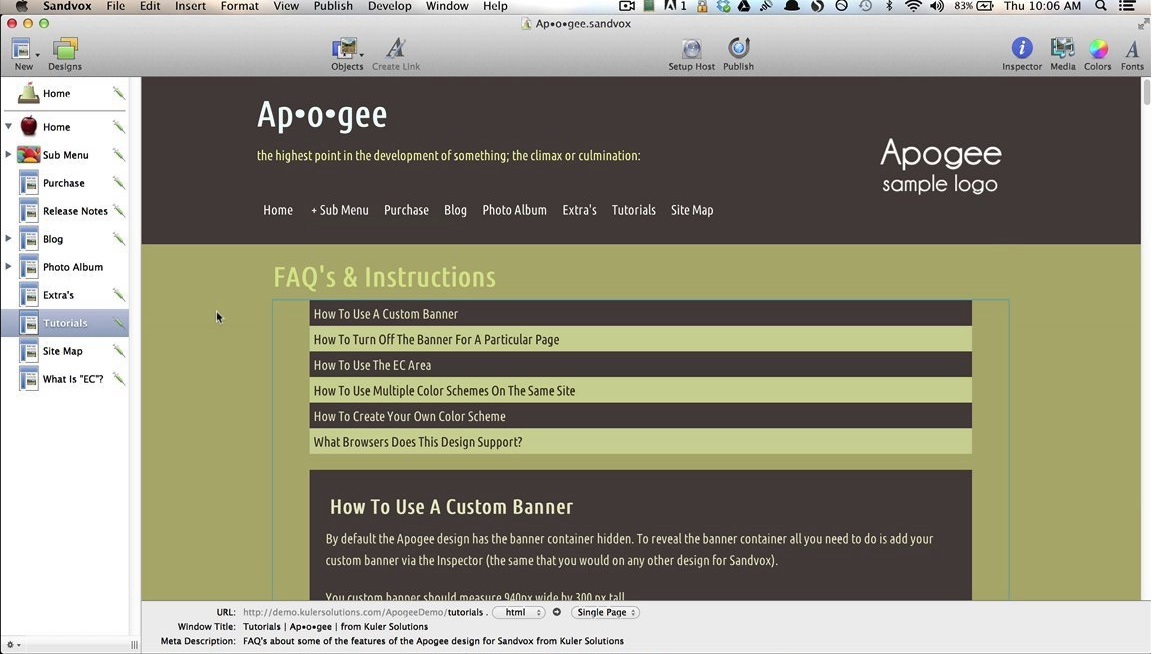

Recently, I bought Sandvox and, although I had a few problems, their tech support was able to talk me through them in short order. I understand that some very nice sites have been created with RapidWeaver, but the learning curve was higher than I could afford. However, without spending a large amount of time trying to figure it out, I wasn't able to create anything in RapidWeaver that didn't look clunky, or like something that was created by an online web authoring program.
SANDVOX MAC MAC
After switching to a Mac at about the same time this thread was current, I looked over both RapidWeaver and Sandvox and decided to buy RapidWeaver, along with some of the add-ons to it, such as blocks and some others.

Posed the same question, Google’s representative, White, said his understanding was that Google had “data access controls in place that govern how data from our third-party services are used.I know this is a very old thread but I came across it on a Google search and wondered whether the collective opinions of those here might have changed. Sidecar ended the need for a third-party app, after apps like Duet and Luna first proved the market.Īnother example was when Apple built screen-time controls into its iOS software, but didn’t provide the makers of third-party screen-time apps with an API so consumers could use their preferred apps to configure Apple’s Screen Time settings via the third-party’s specialized interface or take advantage of other unique features.īlumenthal said he interpreted Andeer’s response as to whether Apple has a “data firewall” as a “no.” But it’s harder to stretch it to areas where Apple makes smaller enhancements - like when Apple introduced Sidecar, a feature that allowed users to make their iPad a secondary display. His argument may hold true when there are strong rivalries, like Spotify versus Apple Music, or Netflix versus Apple TV+, or Kindle versus Apple Books. What we do is offer up a new choice and a new innovation,” Andeer stated. And, sometimes, the alternatives are more popular than Apple’s own product, he noted. He went on to note that over the past 12 years, Apple has only introduced “a handful of applications and services,” and in every instance, there are “dozens of alternatives” on the App Store. Now Tile claims Apple has also unfairly entered its market with AirTag.ĭuring his questioning, Blumenthal asked Apple and Google’s representatives at the hearing - Kyle Andeer, Apple’s chief compliance officer and Wilson White, Google’s senior director of Public Policy & Government Relations, respectively - if they employed any sort of “firewall” in between their app stores and their business strategy.Īndeer then answered, “Senator, we have controls in place.”
SANDVOX MAC FOR MAC OS
Over the years, developers claimed Apple has “sherlocked” a number of apps, including Konfabulator (desktop widgets), iPodderX (podcast manager), Sandvox (app for building websites) and Growl (a notification system for Mac OS X) and, in more recent years, F.lux (blue light reduction tool for screens) Duet and Luna (apps that makes iPad a secondary display), as well as various screen-time-management tools. The nickname “Sherlock” later became shorthand for any time Apple copies an idea from a third-party developer that threatens to or even destroys their business. Following the success of Karelia’s product, Apple added Watson’s same functionality into its own search tool, and Watson was effectively put out of business. A third-party developer, Karelia Software, created an alternative tool called Watson. Sherlock, which has its own Wikipedia entry under software, comes from Apple’s search tool in the early 2000s called Sherlock. Apple, in particular, was called out for the practice of copying other apps by Senator Richard Blumenthal (D-CT), who said the practice had become so common that it earned a nickname with Apple’s developer community: “sherlocking.” Senate, Apple and Google representatives were questioned on whether they have a “strict firewall” or other internal policies in place that prevent them from leveraging the data from third-party businesses operating on their app stores to inform the development of their own competitive products.


 0 kommentar(er)
0 kommentar(er)
